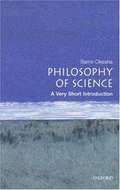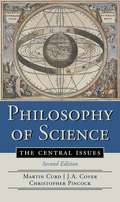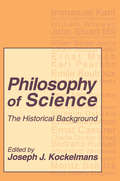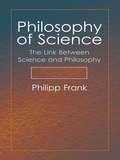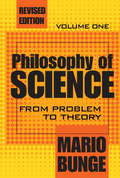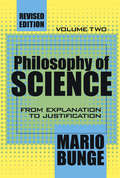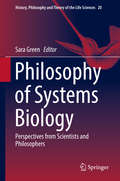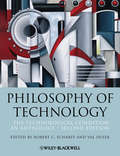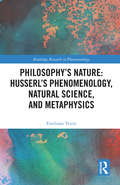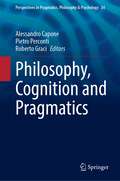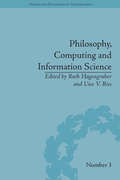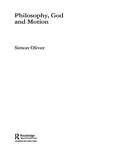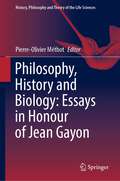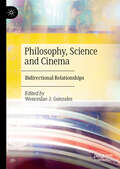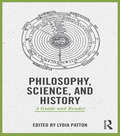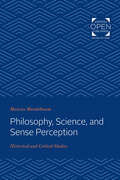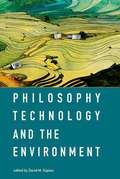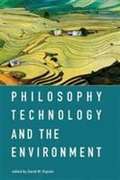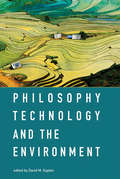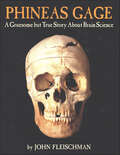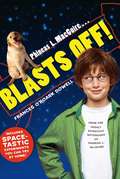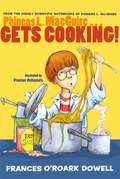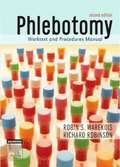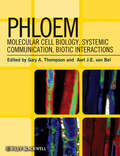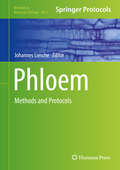- Table View
- List View
Philosophy of Science: A Very Short Introduction
by Samir OkashaWhat is science? Is there a real difference between science and myth? Is science objective? Can science explain everything? This Very Short Introduction provides a concise overview of the main themes of contemporary philosophy of science. Beginning with a short history of science to set the scene, Samir Okasha goes on to investigate the nature of scientific reasoning, scientific explanation, revolutions in science, and theories such as realism and anti-realism. He also looks at philosophical issues in particular sciences, including the problem of classification in biology, and the nature of space and time in physics. The final chapter touches on the conflicts between science and religion, and explores whether science is ultimately a good thing.
Philosophy of Science: The Central Issues
by Christopher Pincock Martin Curd J. A. CoverBoth an anthology and an introductory textbook, Philosophy of Science: The Central Issues offers instructors and students a comprehensive anthology of fifty-two primary texts by leading philosophers in the field and provides extensive editorial commentary that places the readings in a wide philosophical context.
Philosophy of Science: The Historical Background
by Joseph J. KockelmansThis anthology of selections from the works of noted philosophers affords the student an immediate contact with the unique historical background of the philosophy of science. The selections, many of which have not been readily accessible, follow the development of the philosophy of science from 1786 to 1927. Each selection is preceded by a brief introduction by the editor designed to familiarize the reader with a particular philosopher and provide insights into his work.Joseph J. Kockelmans divides the selections into several sections. Part 1, from 17861850, includes chapters by Immanuel Kant, on the metaphysical foundations of natural science, John Frederick William Herschel, on experience and the analysis of phenomena, William Whewell, on the nature and conditions of inductive science, and John Stuart Mill, on induction and the law of universal causation; part 2, from 18701899, includes chapters by Hermann Von Helmholtz, on the origin and significance of geometrical axioms, William Stanley Jevons, on the philosophy of inductive inference, John Bernard Stallo, on the kinetic theory of gasses and the conditions of the validity of scientific hypotheses, Ernst Mach, on the economical nature of physical inquiry, Karl Pearson, on perceptual and conceptual space, Emile Boutroux, on mechanical laws, Heinrich Hertz, on the appropriateness, correctness, and permissibility of scientific theories, and Ludwig Boltzmann, on the fundamental principles and basic equations of mechanics.The third part, covering the first decade of the twentieth century, includes chapters by Henri Jules Poincare, on science and reality, Charles Peirce, on Induction, Pierre Marie Duhem, on the laws of physics, William Ostwald, on energetism and mechanics, Emile Meyerson, on identity of thought and nature as the final goal of science, Ernst Cassirer, on functional concepts of natural science; part 4, from 19101927, includes chapters by Charles Dunbar Broad, on phenomenalism, Alfred North Whitehead, on time, space, and material, Bertrand Russell, on the world of physics and the world of sense, Norman Robert Cambbell, on the meaning of science, Moritz Schlick, on basic issues of the philosophy of natural science, and Percy Williams Bridgman, on the concepts of space, time, and causality.Philosophy of Science provides a concise single volume text to the discipline and enables students to understand and evaluate the various trends in our contemporary philosophy of science.Joseph J. Kockelmans is professor emeritus of philosophy at the Pennsylvania State Univers
Philosophy of Science: The Link Between Science and Philosophy
by Philipp FrankA great mathematician and teacher bridges the gap between science and the humanities in this exposition of the philosophy of science. Philipp Frank, a distinguished physicist and philosopher in his own right, traces the history of science from Aristotle to Einstein to illustrate philosophy’s ongoing role in the scientific process.Suitable for undergraduate students and other readers, this volume explains modern technology’s role in the gradual erosion of the rapport between physical theories and philosophical systems, and offers suggestions for restoring the link between these related areas. Dr. Frank examines the ancient Greek concept of natural science to illustrate the development of modern science; then, using geometry as an example, he charts its progress from Euclidean principles through the interpretations of Descartes, Mill, Kant, and the rise of four-dimensional and non-Euclidean geometry. Additional topics include the laws of motion, before and after innovations of Galileo and Newton; perceptions of motion, light, and relativity through the ages; metaphysical interpretations of relativistic physics; the motion of atomic objects and the phenomena and formulations of atomic physics; and the principle of causality and the validation of theories.
Philosophy of Science: Volume 1, From Problem to Theory
by Mario BungeOriginally published as Scientific Research, this pair of volumes constitutes a fundamental treatise on the strategy of science. Mario Bunge, one of the major figures of the century in the development of a scientific epistemology, describes and analyzes scientific philosophy, as well as discloses its philosophical presuppositions. This work may be used as a map to identify the various stages in the road to scientific knowledge.Philosophy of Science is divided into two volumes, each with two parts. Part 1 offers a preview of the scheme of science and the logical and semantical took that will be used throughout the work. The account of scientific research begins with part 2, where Bunge discusses formulating the problem to be solved, hypothesis, scientific law, and theory.The second volume opens with part 3, which deals with the application of theories to explanation, prediction, and action. This section is graced by an outstanding discussion of the philosophy of technology. Part 4 begins with measurement and experiment. It then examines risks in jumping to conclusions from data to hypotheses as well as the converse procedure.Bunge begins this mammoth work with a section entitled "How to Use This Book." He writes that it is intended for both independent reading and reference as well as for use in courses on scientific method and the philosophy of science. It suits a variety of purposes from introductory to advanced levels. Philosophy of Science is a versatile, informative, and useful text that will benefit professors, researchers, and students in a variety of disciplines, ranging from the behavioral and biological sciences to the physical sciences.
Philosophy of Science: Volume 2, From Explanation to Justification
by Mario BungeOriginally published as Scientific Research, this pair of volumes constitutes a fundamental treatise on the strategy of science. Mario Bunge, one of the major figures of the century in the development of a scientific epistemology, describes and analyzes scientific philosophy, as well as discloses its philosophical presuppositions. This work may be used as a map to identify the various stages in the road to scientific knowledge.Philosophy of Science is divided into two volumes, each with two parts. Part 1 offers a preview of the scheme of science and the logical and semantical took that will be used throughout the work. The account of scientific research begins with part 2, where Bunge discusses formulating the problem to be solved, hypothesis, scientific law, and theory.The second volume opens with part 3, which deals with the application of theories to explanation, prediction, and action. This section is graced by an outstanding discussion of the philosophy of technology. Part 4 begins with measurement and experiment. It then examines risks in jumping to conclusions from data to hypotheses as well as the converse procedure.Bunge begins this mammoth work with a section entitled ""How to Use This Book."" He writes that it is intended for both independent reading and reference as well as for use in courses on scientific method and the philosophy of science. It suits a variety of purposes from introductory to advanced levels. Philosophy of Science is a versatile, informative, and useful text that will benefit professors, researchers, and students in a variety of disciplines, ranging from the behavioral and biological sciences to the physical sciences.
Philosophy of Systems Biology
by Sara GreenThe emergence of systems biology raises many fascinating questions: What does it mean to take a systems approach to problems in biology? To what extent is the use of mathematical and computational modelling changing the life sciences? How does the availability of big data influence research practices? What are the major challenges for biomedical research in the years to come? This book addresses such questions of relevance not only to philosophers and biologists but also to readers interested in the broader implications of systems biology for science and society. The book features reflections and original work by experts from across the disciplines including systems biologists, philosophers, and interdisciplinary scholars investigating the social and educational aspects of systems biology. In response to the same set of questions, the experts develop and defend their personal perspectives on the distinctive character of systems biology and the challenges that lie ahead. Readers are invited to engage with different views on the questions addressed, and may explore numerous themes relating to the philosophy of systems biology. This edited work will appeal to scholars and all levels, from undergraduates to researchers, and to those interested in a variety of scholarly approaches such as systems biology, mathematical and computational modelling, cell and molecular biology, genomics, systems theory, and of course, philosophy of biology.
Philosophy of Technology: The Technological Condition: An Anthology (Blackwell Philosophy Anthologies #3)
by Robert C. ScharffThe new edition of this authoritative introduction to the philosophy of technology includes recent developments in the subject, while retaining the range and depth of its selection of seminal contributions and its much-admired editorial commentary. Remains the most comprehensive anthology on the philosophy of technology available Includes editors’ insightful section introductions and critical summaries for each selection Revised and updated to reflect the latest developments in the field Combines difficult to find seminal essays with a judicious selection of contemporary material Examines the relationship between technology and the understanding of the nature of science that underlies technology studies
Philosophy's Nature: Husserl's Phenomenology, Natural Science, and Metaphysics (Routledge Research in Phenomenology)
by Emiliano TrizioThis book offers a systematic interpretation of the relation between natural science and metaphysics in Husserl’s phenomenology. It shows that Husserl’s account of scientific knowledge is a radical alternative to established methods and frameworks in contemporary philosophy of science. The author’s interpretation of Husserl’s philosophy offers a critical reconstruction of the historical context from which his phenomenological approach developed, as well as new interpretations of key Husserlian concepts such as metaphysics, idealization, life-world, objectivism, crisis of the sciences, and historicity. The development of Husserl’s philosophical project is marked by the tension between natural science and transcendental phenomenology. While natural science provides a paradigmatic case of the way in which transcendental phenomenology, ontology, empirical science, and metaphysics can be articulated, it has also been the object of philosophical misunderstandings that have determined the current cultural and philosophical crisis. This book demonstrates the ways in which Husserl shows that our conceptions of philosophy and of nature are inseparable. Philosophy’s Nature will appeal to scholars and advanced students who are interested in Husserl and the relations between phenomenology, natural science, and metaphysics.
Philosophy, Cognition and Pragmatics (Perspectives in Pragmatics, Philosophy & Psychology #34)
by Alessandro Capone Pietro Perconti Roberto GraciThis book contains essential contributions to enrich and broaden the application field of pragmatics. It provides an example of how the fruitful reflections and refined conceptual distinctions born in the philosophical field can find a practical application in addressing social, cognitive, clinical, and psychological problems. Its chapters address, from different points of view, the relationship between pragmatic linguistics and philosophy, and outline the possible application of pragmatic theories to different domains. Developed during the third Pragmasophia international conference, whose name is derived from the Greek terms πρᾶγμα (action, fact) and σοϕία (knowledge, science), the book aligns itself with its aim to study human actions and activities and how they take shape through language. But ‘Pragma’ and ‘Sophia’ also signal another purpose: highlighting the importance of creating links between empirical investigations on language use, and more traditional philosophical approaches. In this reading, ‘Pragma’ represents the experimental goal devoted to analysing and interpreting language facts. In contrast, the term ‘Sophia’ recalls the original vocation of past philosophers to pursue an ideal of ‘pure knowledge’, disconnected from any practical-economic interest. While maintaining the conference's original purpose of encouraging productive comparisons between different approaches, the book consists of two sections: first, on philosophical approaches, recalls more theoretical aspects (closer to the term ‘Sophia’); the second, ‘Inferential and Cognitive Pragmatics,’ addresses more practical issues affecting domains such as Greek literature, pragmatic disorders, dictionary entries, and speech analysis. The reader, whether in linguists, philosophy or psychology, obtains a complete overview of the most advanced current research lines, both theoretical and empirical, and thus contributes to broadening the scope of pragmatics.
Philosophy, Computing and Information Science (History and Philosophy of Technoscience #3)
by Ruth Hagengruber Uwe V. RissOver the last four decades computers and the internet have become an intrinsic part of all our lives, but this speed of development has left related philosophical enquiry behind. Featuring the work of computer scientists and philosophers, these essays provide an overview of an exciting new area of philosophy that is still taking shape.
Philosophy, God and Motion (Routledge Radical Orthodoxy)
by Simon OliverIn the post-Newtonian world motion is assumed to be a simple category which relates to the locomotion of bodies in space, and is usually associated only with physics. This book shows this to be a relatively recent understanding of motion and that prior to the scientific revolution motion was a broader and more mysterious category, applying to moral as well as physical movements. Simon Oliver presents fresh interpretations of key figures in the history of western thought including Plato, Aristotle, Aquinas and Newton, examining the thinkers’ handling of the concept of motion. Through close readings of seminal texts in ancient and medieval cosmology and early modern natural philosophy, the books moves from antique to modern times investigating how motion has been of great significance within theology, philosophy and science. Particularly important is the relation between motion and God, following Aristotle traditional doctrines of God have understood the divine as the ‘unmoved mover’ while post-Holocaust theologians have suggested that in order to be compassionate God must undergo the motion of suffering. The text argues that there may be an authentically theological, as well as a natural scientific understanding of motion. This volume will prove a major contribution to theology, the history of Christian thought and to the growing field of science and religion.
Philosophy, History and Biology: Essays in Honour of Jean Gayon (History, Philosophy and Theory of the Life Sciences #30)
by Pierre-Olivier MéthotThis book builds on recent scholarship highlighted in the edited collections, Philosophie, histoire, biologie: mélanges offerts à Jean Gayon (Merlin & Huneman, 2018) and Knowledge of Life Today (Gayon & Petit 2018/2019). While honoring the career and the thought of Jean Gayon (1949-2018), this book showcases the continued relevance of Gayon’s interdisciplinary work and illustrates his central place in the community of historians and philosophers of the life sciences.Chapters in this book address Jean Gayon’s intellectual trajectory from historical epistemology to the philosophy of biology, the nature and scope of his philosophical approach to the history of science, and his unique contributions to the history and epistemology of biological concepts and theories. Drawing on published and unpublished sources, the book explores some of Gayon’s most significant contributions to the philosophy, history, and social studies of biology.
Philosophy, Science and Cinema: Bidirectional Relationships
by Wenceslao J. GonzalezNow that cinema is offline and online, the capacity of cinema to relate to philosophy and science has increased. In this regard, this book seeks to deepen the relationship between philosophy, science, and cinema in terms of bilaterality. This analysis leads to several successive levels of analysis. First, between philosophy and cinema, where the philosophical perspective bifurcates in several directions, depending on the philosophical branch used. This affects in both directions: from the philosophical orientation to the cinematographic activity and, from cinema, towards the philosophical line used. Second, the relations between science and cinema also go in both directions. Thus, they are modulated by the type of scientific research used and by the film genre employed. Thus, bilaterality is altogether a network of bidirectional relations modulated by various possibilities of analysis.
Philosophy, Science, and History: A Guide and Reader
by Lydia PattonPhilosophy, Science, and History: A Guide and Reader is a compact overview of the history and philosophy of science that aims to introduce students to the groundwork of the field, and to stimulate innovative research. The general introduction focuses on scientific theory change, assessment, discovery, and pursuit. Part I of the Reader begins with classic texts in the history of logical empiricism, including Reichenbach’s discovery-justification distinction. With careful reference to Kuhn’s analysis of scientific revolutions, the section provides key texts analyzing the relationship of HOPOS to the history of science, including texts by Santayana, Rudwick, and Shapin and Schaffer. Part II provides texts illuminating central debates in the history of science and its philosophy. These include the history of natural philosophy (Descartes, Newton, Leibniz, Kant, Hume, and du Châtelet in a new translation); induction and the logic of discovery (including the Mill-Whewell debate, Duhem, and Hanson); and catastrophism versus uniformitarianism in natural history (Playfair on Hutton and Lyell; de Buffon, Cuvier, and Darwin). The editor’s introductions to each section provide a broader perspective informed by contemporary research in each area, including related topics. Each introduction furnishes proposals, including thematic bibliographies, for innovative research questions and projects in the classroom and in the field.
Philosophy, Science, and Sense Perception: Historical and Critical Studies
by Maurice MandelbaumOriginally published in 1964. In four essays, Professor Mandelbaum challenges some of the most common assumptions of contemporary epistemology. Through historical analyses and critical argument, he attempts to show that one cannot successfully sever the connections between philosophic and scientific accounts of sense perception. While each essay is independent of the others, and the argument of each must therefore be judged on its own merits, one theme is common to all: that critical realism, as Mandelbaum calls it, is a viable epistemological position, even though some schools of thought hold it in low esteem.
Philosophy, Technology, and the Environment
by David M. KaplanEnvironmental philosophy and philosophy of technology have taken divergent paths despite their common interest in examining human modification of the natural world. Yet philosophers from each field have a lot to contribute to the other. Environmental issues inevitably involve technologies, and technologies inevitably have environmental impacts. In this book, prominent scholars from both fields illuminate the intersections of environmental philosophy and philosophy of technology, offering the beginnings of a rich new hybrid discourse. All the contributors share the intuition that technology and the environment overlap in ways that are relevant in both philosophical and practical terms. They consider such issues as the limits of technological interventions in the natural world, whether a concern for the environment can be designed into things, how consumerism relates us to artifacts and environments, and how food and animal agriculture raise questions about both culture and nature. They discuss, among other topics, the pessimism and dystopianism shared by environmentalists, environmental philosophers, and philosophers of technology; the ethics of geoengineering and climate change; the biological analogy at the heart of industrial ecology; green products and sustainable design; and agriculture as a bridge between technology and the environment.ContributorsBraden Allenby, Raymond Anthony, Philip Brey, J. Baird Callicott, Brett Clark, Wyatt Galusky, Ryan Gunderson, Benjamin Hale, Clare Heyward,Don Idhe, Mark Sagoff, Julian Savulescu, Paul B. Thompson, Ibo van de Poel, Zhang Wei,Kyle Powys Whyte
Philosophy, Technology, and the Environment
by David M. KaplanEnvironmental philosophy and philosophy of technology have taken divergent paths despite their common interest in examining human modification of the natural world. Yet philosophers from each field have a lot to contribute to the other. Environmental issues inevitably involve technologies, and technologies inevitably have environmental impacts. In this book, prominent scholars from both fields illuminate the intersections of environmental philosophy and philosophy of technology, offering the beginnings of a rich new hybrid discourse. All the contributors share the intuition that technology and the environment overlap in ways that are relevant in both philosophical and practical terms. They consider such issues as the limits of technological interventions in the natural world, whether a concern for the environment can be designed into things, how consumerism relates us to artifacts and environments, and how food and animal agriculture raise questions about both culture and nature. They discuss, among other topics, the pessimism and dystopianism shared by environmentalists, environmental philosophers, and philosophers of technology; the ethics of geoengineering and climate change; the biological analogy at the heart of industrial ecology; green products and sustainable design; and agriculture as a bridge between technology and the environment.ContributorsBraden Allenby, Raymond Anthony, Philip Brey, J. Baird Callicott, Brett Clark, Wyatt Galusky, Ryan Gunderson, Benjamin Hale, Clare Heyward,Don Idhe, Mark Sagoff, Julian Savulescu, Paul B. Thompson, Ibo van de Poel, Zhang Wei,Kyle Powys Whyte
Philosophy, Technology, and the Environment (The\mit Press Ser.)
by David KaplanContributions by prominent scholars examining the intersections of environmental philosophy and philosophy of technology.Environmental philosophy and philosophy of technology have taken divergent paths despite their common interest in examining human modification of the natural world. Yet philosophers from each field have a lot to contribute to the other. Environmental issues inevitably involve technologies, and technologies inevitably have environmental impacts. In this book, prominent scholars from both fields illuminate the intersections of environmental philosophy and philosophy of technology, offering the beginnings of a rich new hybrid discourse. All the contributors share the intuition that technology and the environment overlap in ways that are relevant in both philosophical and practical terms. They consider such issues as the limits of technological interventions in the natural world, whether a concern for the environment can be designed into things, how consumerism relates us to artifacts and environments, and how food and animal agriculture raise questions about both culture and nature. They discuss, among other topics, the pessimism and dystopianism shared by environmentalists, environmental philosophers, and philosophers of technology; the ethics of geoengineering and climate change; the biological analogy at the heart of industrial ecology; green products and sustainable design; and agriculture as a bridge between technology and the environment.ContributorsBraden Allenby, Raymond Anthony, Philip Brey, J. Baird Callicott, Brett Clark, Wyatt Galusky, Ryan Gunderson, Benjamin Hale, Clare Heyward, Don Idhe, Mark Sagoff, Julian Savulescu, Paul B. Thompson, Ibo van de Poel, Zhang Wei, Kyle Powys Whyte
Phineas Gage: A Gruesome but True Story About Brain Science
by John FleischmanPhineas Gage was truly a man with a hole in his head. Phineas, a railroad construction foreman, was blasting rock near Cavendish, Vermont, in 1848 when a thirteen-pound iron rod was shot through his brain. Miraculously, he survived to live another eleven years and become a textbook case in brain science.At the time, Phineas Gage seemed to completely recover from his accident. He could walk, talk, work, and travel, but he was changed. Gage "was no longer Gage," said his Vermont doctor, meaning that the old Phineas was dependable and well liked, and the new Phineas was crude and unpredictable.His case astonished doctors in his day and still fascinates doctors today. What happened and what didn&’t happen inside the brain of Phineas Gage will tell you a lot about how your brain works and how you act human.
Phineas L. MacGuire . . . Blasts Off!
by Frances O'Roark Dowell Preston McdanielsHouston,we have a problem! Phineas L. MacGuire (a.k.a. Mac) is less than up-to-date on planetary happenings. (Marsquakes? Who knew?) If he's going to be the best scientist in the fourth grade, Mac has to set his sights pretty high. To outer space, actually. But Space Camp is expensive. Where is he going to find enough money for a week on Mars (or a pretty close simulation thereof)? Houston, we have another problem: a gigantic, slobbery dog named Lemon Drop. Mac can earn the money he needs by walking Mrs. McClosky's yellow Lab, but first he needs to survive the walks and the slobber! Good thing Mac is a scientific genius with friends like Ben and Aretha. Together the three of them discover that Lemon Drop is no ordinary dog -- that Lab is a real-life Lab-oratory.
Phineas L. MacGuire . . . Gets Cooking!
by Frances O'Roark Dowell Preston McdanielsChemistry in the kitchen? Phineas L. MacGuire applies his science skills to culinary creations in this food-tastic tale from the bestselling author of Chicken Boy.Phineas L. MacGuire--scientist extraordinaire--has a new chore: cooking dinner every night. He may be a genius, but he knows nothing about following a recipe. A pinch? A dash? A smidge? This doesn't seem very scientific. A pound of spaghetti? Salt on brownies? Lemon in biscuits? Why, these recipes look a little funky. But he'd better learn quickly if he and his friends are going to win the $10,000 Bake-Off prize. And to complicate matters, school bully Evan Forbes has taken a liking to Phineas's brownies...too much of a liking. As in, if Phineas can't make Evan enough brownies, he'll get clobbered for sure. Fortunately for Phineas, he has the help of his friends, and even better, he soon discovers that cooking is kind of like chemistry. So the whole recipe thing might just work out--as long as he can keep his cool in the kitchen.
Phlebotomy Worktext and Procedure Manual (Second Edition)
by Richard Robinson Robin S. WarekoisThe book provides a complete introduction to the practice of phlebotomy in all its aspects.
Phloem
by Aart J.E. van Bel Gary A. ThompsonPhloem: Molecular Cell Biology, Systemic Communication, Biotic Interactions is a timely collection of research on the cellular and molecular biology of this plant vascular tissue. Recent advances in phloem research have revealed the centrality of this plant tissue to whole plant development and physiology. Building on advances made through developments of new analytical technologies, this book will provide readers with a current and comprehensive reference on the role of phloem in plant growth and development. Collecting the work of a global team of leading researchers, Phloem will provide the reader with a valuable synthesis of the latest research in a single volume.
Phloem: Methods and Protocols (Methods in Molecular Biology #2014)
by Johannes LiescheThis detailed book presents methods that enable the determination of parameters relevant to phloem research in the most efficient ways, putting plant scientists with access to adequate instrumentation in the position to answer any phloem-related question. The collection explores techniques that have been used for decades, such as tracing phloem transport with carbon isotopes, as well as recent developments, such as esculin-based assays of phloem transport and super-resolution microscopy of phloem proteins. As such, the book presents the state-of-the-art in phloem research and, at the same time, a starting point for the development of new methods that will fill the remaining gaps in the phloem researcher’s toolbox in the future. Written for the highly successful Methods in Molecular Biology series, chapters include introductions to their respective topics, lists of the necessary materials and reagents, step-by-step, readily reproducible protocols, and tips on troubleshooting and avoiding known pitfalls. Authoritative and comprehensive, Phloem: Methods and Protocols is an ideal guide for all researchers exploring this challenging area of plant biology.
